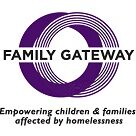FAQs

Who does Family Gateway serve?
We serve families with children experiencing homelessness. We assist families of all types and sizes, and we keep families together. Many shelters have restrictions on what constitutes a family or have multiple requirements that families must overcome before they can be housed; here a grandmother/grandchild, single mother/child, single father/child, a married couple with child – all are welcome. In addition, many shelters won’t allow males over a certain age to sleep in the same facility as females. This means a single mother might be faced with choosing between sleeping in her car with all of her children or seeking shelter and having her 12-year old son sleep on a cot in a common room with hundreds of homeless men in a different shelter. We keep families together and work with them as they are.
How many families does Family Gateway serve?
We operate two emergency shelters for families with children: a 50-room shelter at a former Candlewood Suites property in Far North Dallas and 10 rooms at The Salvation Army. Our shelter rooms turn over on an ongoing basis as families gain self-sufficiency and move into a different level of housing support. We have arrangements with apartment complexes across Dallas to house more than 100 additional families who need a different level of support.
In 2023:
- 1211 families were diverted from shelter.
- 228 of the diverted families were served with eviction prevention assistance.
- 540 families were served in our emergency shelter and hotel overflow program.
- 218 families were served in supportive housing.
Do the current facilities/apartment relationships fully support the community’s needs for family homelessness?
Not at all. As the service access point for families with children experiencing a homeless crisis in Dallas County, we pre-screened nearly 5,000 calls for assistance last year through the Homeless Crisis Helpline. Additionally, both of our shelter locations are often full. When this is the case, we pay for families to stay in overflow hotel space until a shelter room becomes available so they do not return to sleeping in their cars.
How long does a family stay in care?
It varies depending on the family’s situation and the factors that led them to homelessness. We evaluate each family according to their needs. In 2023, our average length of stay in shelter was 88 days.
In our external supportive housing programs (through Dallas Housing Authority vouchers or Permanent Supportive Housing), families receive services for a minimum of one year. Families who have severely disabled (mental/physical) members may receive services for much longer periods of time, funding permitting through HUD.
Why do families become homeless?
It’s a complicated question with many answers. Many of our families live in poverty or on the edge of poverty and then suffer a devastating event like the loss of a job, a serious illness, violence in the household, etc. Without a safety net or family to fall back on, they come to us. Some families suffer from generational homelessness or significant trauma for which they do not have the skills to navigate. Most of our families are young, uneducated single mothers who need a great deal of support to finish their education and receive job training while we care for (or find care for) their children. We are always proud when our families move on to self-sufficiency. We always retain a seat on our Board for a former client who found his/her way to a better life.
What partnerships is Family Gateway involved in to avoid duplication of efforts?
Our case managers provide comprehensive needs assessments and then connect families to community resources and programs, such as education completion, job training, etc. We partner with multiple agencies to provide services. Because early childhood education is so important to us, we work hard to make sure our children get enrolled in preschool or Early Head Start programs.
How are the panhandlers we see on the streets or homeless living in encampments related to Family Gateway?
We don’t house what you may think of as the “typical homeless.” Those we see panhandling on the street or living under a bridge are the most visible of our city’s homeless population. It is likely rare that you’ve seen a homeless mother and children in the street. Family Gateway serves those who are mostly invisible to us, as they sleep in their cars, “couch surf” from place to place, and live in and out of hotels.
Through data derived from the Homeless Crisis Helpline, in one year we identified 1,765 families with children who were literally or imminently homeless; this is an estimated 4,400 children. 1,132 families with children were determined to be “doubled up” with other family members but in no immediate need of leading; this is an estimated 2,830 children.
Is there a religious or faith-based component here?
We have strong ties to a number of religious institutions that support this important work. We are firm believers in respecting all religious backgrounds and are careful not to emphasize a particular set of beliefs over another. We encourage our families to develop their individual spiritual lives, according to their own faith backgrounds.
There is a lot about homelessness in the news. How does that affect Family Gateway?
Federal, state, and local government priorities (and therefore funding) have shifted to focus on the chronically homeless and Veterans. It is therefore more important than ever before that we engage our community to support families with children affected by homelessness. These families continue to be our number one priority, even if more visible homeless populations are the primary focus of most other providers.
How do I refer families?
Option 1: Families may walk into the Simmons Family Gateway Resource Center from 7 AM – 5 PM 365 days per year. At this location, we assess families, try to help them avoid shelter, if possible (divert them), or place them into shelter or overflow care when shelter space is full. This facility is collocated with Catholic Charities at 1421 W. Mockingbird Lane. Our separate entrance is on the west side of the building.
Option 2: Families who have internet access can complete an online triage tool 24 x 7 365 days a year by going to www.familygateway.org and selecting Get Assistance. The online tool is in English and Spanish. Our Assessment & Diversion team will respond from 7 AM – 5 PM. Our crisis team will respond from 5 PM to 11 PM, and our answering service will respond from 11 PM – 7 AM. When a family completes an online tool and is in need or critical and immediate care, there is an auto response that also gives the phone number of our overnight guard at one of our shelter locations.
Option 3: Families may call the Homeless Crisis Helpline at 1-888-411-6802 and select option 3 to be routed to our call center. Hours are staffed as noted above. Families who do not need immediate assistance will be contacted during regular business hours. Families who need critical and immediate assistance will be helped the same day.
Any restrictions?
We only serve families who have some sort of documented evidence that they have a prior residence in Dallas or Collin Counties. We cannot serve those with a sex offense or other serious crime against children or families without a confirmed prior residence in our two county service area.
What paperwork is required?
We will accept families without all paperwork in hand at the time of intake, but we need documentation of homelessness, IDs, birth certificates, etc. within a short period of time after entry in order to comply with funder requirements. We can assist in gathering IDs, etc. We do need to document that each family is from our service area (Dallas or Collin counties) and refer migrant families to our partners at Catholic Charities since they have special expertise we do not have with the unique needs of this population.
